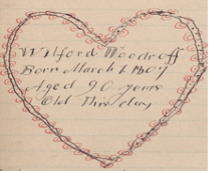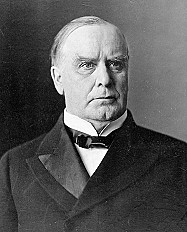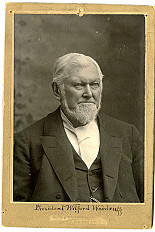
Day in the Life
Journal Entry
March 1, 1897
 Wilford Woodruff
Wilford Woodruff
Born March 1, 1807
Aged 90 years
Old this day
 Emma Woodruff
Emma Woodruff
Born March 1, 1838
Aged 59 years
Old this day
This is my 90 Birth day and my wife Emma 59 Birth
Day. We meet some 12,000 People in the Big Tabernacle who
have Met to celebrate our Birth Day which congregation is
composed of All parties sects & Denominations I deliver the first
address to the Assembly, followed by G. Q. Cannon L. Snow & others
I was almost covered up with flowers & roses. At the close of
the services myself & wife Emma took seats upon Elevated
chairs & shook Hands with the congregation as they passed us
some 8000 people of course our arms aked when we
got through but it was a great Day. All the papers published
our speeches and Liknesses it is vary remarkable how
my life has been preserved through so many years considering
what I have passed through in my day and Generation
I have to acknowledge the hand of God in the preservation
of my Life up to the present hour God Moves in a misterious way
People
Browse people Wilford Woodruff mentioned on this day in his journal. Click on the person's name to view a short bio and other pages they are mentioned on or click on "View in Family Search" to view their FamilySearch profile.
Places
Browse places mentioned in Wilford Woodruff's journal entry on this day. Click on the place names to view other pages where they are mentioned.
Related Documents
Browse other documents with this same date. These could include pages from Wilford Woodruff's autobiographies, daybooks, letters, histories, and personal papers. Click on the document titles to view the full document.


Letter from Charles S. Green, 1 March 1897

Letter from Edwin Tunis Rappleye, 1 March 1897

Letter from Frank Snow, 1 March 1897

Letter from John H. Wall, 1 March 1897

Letter from Robert Galloway Lowe, 1 March 1897

Telegram from Morton B. Hirsch, 1 March 1897

Community - Invitation to Wilford Woodruff's 90th Birthday Celebration to Douglas Owen Woodruff, 1 March 1897

Community - Invitation to Wilford Woodruff's 90th Birthday Celebration to Joseph John Daynes Jr. and Winnifred Blanche Woodruff Daynes, 1 March 1897

Letter from John R. Howard, 1 March 1897

Letter from Robert Hamilton Orr and Agnes Elizabeth Leonard Orr Bartlett, 1 March 1897

Letter from Belle Randall and Mrs. E. Fletcher, 1 March 1897

Family - Autograph to Florence Snow Critchlow, 1 March 1897

Letter from Levi James Taylor Jr., 1 March 1897

Letter from William Jefferies, 1 March 1897

Letter from William Tarbet Stapley, 1 March 1897

Autobiography 1897 Deseret Weekly

Letter from L. N. Hune, 1 March 1897

Discourse 1897-03-01

Letter from John Whittaker Taylor, 1 March 1897

Letter from Ephraim H. Nye, 1 March 1897

Business/Financial - Account Book, 1889-1898

Business/Financial - Account Book, 1889-1898

Business/Financial - Account Book, 1889-1898

Telegram from William J. Kerr, 1 March 1897

Telegram from John Bray Maiben, 1 March 1897

Personal - Birthday Poem from Louisa Lula Greene Richards, 1 March 1897
Events
View selected events in the two months surrounding this date in Wilford Woodruff's life. Click on the dates to jump to that day in Wilford Woodruff's journal.



